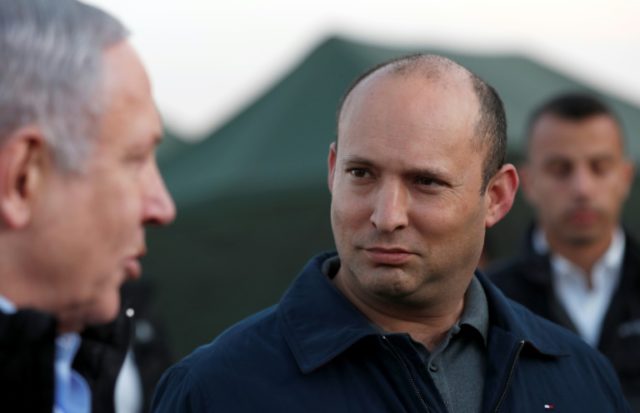TEL AVIV – Israel and the U.S. will work together to combat Iranian terror in the Middle East, Defense Minister Naftali Bennett said following a trip to the U.S., with the task being divvied up so Jerusalem will work to curb Iran’s entrenchment in Syria while Washington will combat the Islamic Republic’s presence in Iraq.
According to Bennett, the two allies were working to prevent Iran from building a land corridor stretching from Tehran all the way to the Mediterranean. His remarks came after he met with senior defense officials in Washington, including Defense Secretary Mark Esper.
“I met with my colleague the American defense minister Mark Esper, and we sorted out the coordination exactly — they’re taking Iraq, and we’re taking Syria,” Bennett said at a campaign event near Tel Aviv.
He confirmed Israel was behind strikes against Iranian targets in Syria last Thursday. Israel has conducted hundreds of airstrikes over the past few years but generally maintains a policy of ambiguity.
“We have significantly intensified, including this week, with very strong attacks against Iran, against the Iranian presence, against Iranian bases, against Iranian surface-to-air missiles, against Iranian fighters, against Iranian militias in Syria and more and more and more, and look at how we’re turning their strength into weakness,” he said in remarks translated by The Times of Israel.
“Foreign media reported this week that 23 Syrians and Iranians were killed there. Those are large numbers and we will do more and more so that Syria becomes their Vietnam,” he said.
“It’s like a contiguous puzzle — Iran, Iraq, Syria, Lebanon. Imagine a water pipe, only the water is rockets and terrorism. If you take out a piece of the pipe, then you’ve broken up the contiguity and it dries up,” Bennett said.
“That territory called Syria — we have intelligence superiority and aerial superiority there,” he said. “It’s a bad place for Iran to be.”
He called for direct military action against Iran and its terror proxies, claiming that conducting pinpointed airstrikes on weapons convoys was not effective enough.
“I don’t want to chase after convoys because for every convoy you hit, you miss five convoys, and slowly [Hezbollah] accumulates the critical mass of rockets that threaten us,” he said.
Seventy percent of Israel’s security problems could be attributed to Iran, Bennett said, noting Tehran’s sponsor of terror groups including Hezbollah and the Gaza-based Hamas and Palestinian Islamic Jihad.
Hezbollah has amassed an estimated 130,000 missiles since the 2006 Second Lebanon War.
“We are losing our boys in [2014’s Operation] Protective Edge [in Gaza], in the Second Lebanon War, in battles with Iran’s fingertips. And who is immune all the while? The head of the octopus,” Bennett told synagogue-goers in the largely religious Givat Shmuel.
“We are in a process of switching to hurting the head of the octopus — Iran’s power. I am not necessarily talking about a full-blown war with Iran tomorrow; it is more similar to the Cold War between the Soviet Union and the United States, with the two regional powers Israel and Iran.”
Bennett said in future conflicts, he aims to avoid sending Israeli soldiers into Lebanon or Gaza.
“That is playing on their home turf, and I want to relocate the game to our home turf,” he said.
Instead, combating Iran itself would automatically undermine Hezbollah and Hamas, Bennett said.
Amid escalating attacks from Gaza, Bennett this week warned Hamas that Israel would take “lethal action” against it.
He also vowed that the IAF would strike rocket factories and other Hamas weapons infrastructure in the Strip not only in response to rocket launches, but also to the launch of balloons and other airborne devices carrying explosives.

COMMENTS
Please let us know if you're having issues with commenting.